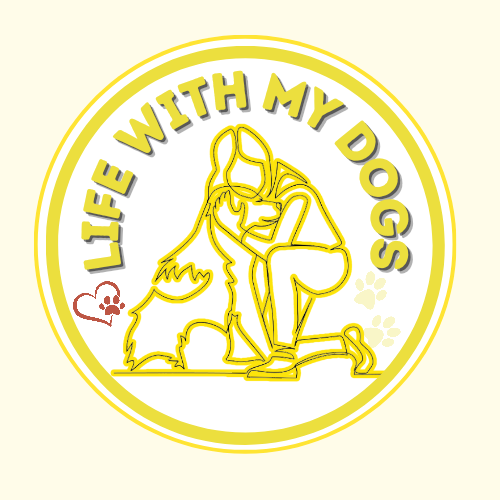LifeWithMyDogs is supported by our audience. When you purchase through one of our links, we may earn a small affiliate commission. As an Amazon Associate I earn from qualifying purchases. Your cost is not affected.
**********
Senior dog supplements have become an increasingly popular topic among pet owners. As our canine companions age gracefully into their golden years, their nutritional needs can shift.
This article explores how targeted supplements can play a valuable role in supporting their overall health and well-being. We’ll delve into the evolving dietary requirements of senior dogs, unpack the benefits of specific supplements, and offer guidance on choosing the best products for your furry friend.
By understanding how supplements can contribute to joint health, cognitive function, and overall vitality, you can empower your senior dog to enjoy a fulfilling and comfortable life in their later years.
Senior Dog Supplements: Enhancing Health in Your Pet’s Golden Years
As dogs age, their nutritional needs evolve, making it essential to consider how dietary supplements can contribute to their overall health and quality of life.
Senior dogs often face a decline in organ function, joint mobility, and energy levels, which can be addressed to some extent with the right supplements.

Probiotics, for instance, are frequently recommended to support digestive health in older dogs, while others like glucosamine are lauded for their ability to aid in joint health and mobility.
Determining the most beneficial supplements requires an understanding of the unique needs of aging canines. A well-balanced diet is crucial, and supplements can play a significant role in providing the additional nutrients that senior dogs may require.
It’s important to choose high-quality supplements and to understand the correct dosages, as well as any potential side effects.
A veterinarian can offer guidance on what supplements could be helpful based on an individual dog’s specific health concerns.

Key Takeaways
- Nutritional needs of senior dogs can be supported with targeted dietary supplements.
- Selecting high-quality supplements and understanding proper dosages are vital for efficacy and safety.
- Consulting with a veterinarian is essential for personalized supplement recommendations.

Understanding Senior Dog Nutrition
As dogs age, their nutritional needs evolve, making it crucial for pet owners to adjust their diets accordingly.
Adequate nutrition can help manage chronic health conditions and support overall well-being in senior dogs.

Nutritional Requirements for Aging Dogs
Older dogs require a careful balance of nutrients to maintain health and vitality. They often need fewer calories due to a more sedentary lifestyle but still require protein to help maintain muscle mass.
Aging dogs may benefit from easily digestible protein sources and quality carbohydrates for energy.
It’s essential to provide a diet tailored to their needs, which may include adjustments in calorie intake and the addition of specific nutrients.
The Importance of Omega Fatty Acids
Omega fatty acids, specifically omega-3 and omega-6, play a critical role in a senior dog’s diet.
These fatty acids can support cognitive health and are vital for maintaining healthy joints, skin, and coat.
Sources like fish oil or flaxseed can be excellent additions to an older dog’s diet, potentially helping to manage inflammation and offering cardiovascular benefits.
Probiotics and Digestive Health
Senior dogs often experience changes in digestive function, making probiotics a beneficial supplement for maintaining a healthy gut.
Probiotics can aid in digestion and absorption of nutrients while helping to maintain the balance of good bacteria in the digestive system.
Improved gut health can lead to better overall condition and vitality in senior dogs, as proper digestion is crucial for their health.
Common Supplements for Senior Dogs
Senior dogs often require additional support for their changing health needs. Key supplements focus on joint health, cognitive function, and immune system support.

Joint Health Supplements
- Glucosamine & Chondroitin: These compounds are crucial for maintaining cartilage and joint health in aging dogs. They are often found in senior dog vitamins and supplements to help reduce joint pain and improve mobility.
- Omega-3 Fatty Acids: Omega-3s, particularly EPA and DHA from fish oil, are known to help decrease inflammation and mitigate arthritis symptoms.
Cognitive Support Supplements
- Phosphatidylserine: This supplement aids in cognitive function, helping senior dogs maintain a sharp mind.
- Antioxidants like Vitamin E and C: These are important for protecting against cognitive aging and can be found in supplements like NaturVet VitaPet which is specifically formulated for elderly dogs.
Antioxidants for Immune Function
- Vitamin E: This powerful antioxidant helps bolster the immune system against oxidative damage.
- Selenium: Selenium works in conjunction with Vitamin E and helps to strengthen the body’s natural defenses in senior dogs.
Choosing the Right Supplements
When selecting supplements for a senior dog, it’s important to focus on high-quality ingredients that meet the specific needs of the dog and to seek guidance from a professional vet.

Evaluating Ingredient Quality
One must prioritize supplements that contain high-quality protein, vitamins, and antioxidants.
For instance, products endorsed by the American Kennel Club suggest that natural prebiotic fibers and omega fatty acids are beneficial for elderly dogs.
Tailoring to Individual Dog Needs
Every senior dog has unique health requirements.
Joint support, for example, might be critical for some dogs, which is why choosing a supplement like NaturVet VitaPet Daily Vitamins for Senior Dogs could be pertinent as it aids daily joint function.
Consulting with a Veterinarian
A veterinarian’s input is invaluable when choosing supplements.
They can recommend products based on a thorough assessment of the dog’s health.
Vets might suggest options like Zesty Paws Senior Advanced 11-in-1 Bites which are designed for the comprehensive needs of older dogs.
Administration and Dosage
The proper administration and precise dosage of supplements are critical to the efficacy and safety for senior dogs.

Dosage Guidelines
Dosages for supplements vary based on a dog’s weight, age, and specific health needs.
Products often come with a manufacturer’s guide, which should be strictly followed to avoid underdosing or overdosing.
For instance, supplements containing glucosamine and chondroitin typically offer dosage instructions based on weight brackets, ensuring each dog receives the optimal amount for joint support.
Methods of Supplement Administration
Senior dogs may take supplements in various forms, including chewable tablets, capsules, liquids, and powders. The choice might depend on the dog’s preference and ease of ingestion.
Chewable tablets are often favored for their convenience and can be given directly or hidden in food.
Liquid forms can be mixed into meals, ensuring that the dog receives the full dosage.
Powders and capsules may be concealed in treats or meals.
Tools like pill dispensers can help give tablets or capsules, while measuring cups ensure accurate dosing of liquids.
For MSM supplements specifically, various options such as powders, capsules, or tablets are available, providing flexibility for owners to choose the best method of administration for their senior dog.
Safety and Side Effects
When considering supplements for senior dogs, it is crucial to be aware of potential side effects and how these products may interact with other medications.
Recognizing Side Effects
Senior dogs may exhibit side effects to certain supplements that owners should monitor closely.
These effects can range from mild to severe and include gastrointestinal upset (such as diarrhea or vomiting), allergic reactions (like itching or hives), or changes in behavior or energy levels.
The product Leap Years® supplement notes no known interactions or adverse effects in dogs receiving high dosages, yet it’s essential to observe each dog’s response to any supplement individually.
Interactions with Medications
Supplements can interact with medications, causing reduced effectiveness or enhanced side effects of either the supplement or the medication.
For example, a supplement rich in Vitamin K might decrease the efficacy of blood-thinning medications.
Owners are advised to consult with a veterinarian before beginning any new supplement regimen to ensure it won’t negatively interact with their senior dog’s current medications.
Sustainable and Organic Options for Senior Dog Supplements
The trend towards sustainable and organic supplements is gaining momentum among pet owners who prioritize natural and environmentally friendly products.

Organic Supplements
Organic supplements, free from synthetic additives, pesticides, and GMOs, offer a natural approach to your senior dog’s health. They often contain higher nutrient levels and fewer harmful chemicals, making them ideal for aging dogs with sensitivities.
Sustainable Sourcing
Brands are increasingly committing to sustainable practices, such as ethical ingredient sourcing and eco-friendly packaging. Choosing supplements with transparent sourcing information ensures that the products are beneficial not only for your pet but also for the planet.
Integrating Supplements into Your Senior Dog’s Diet
Whole Foods First
Ensure your senior dog’s diet consists of high-quality, nutrient-dense foods, with supplements serving to enhance this primary nutrition.
Consult Your Vet
Always discuss new supplements with your veterinarian to tailor choices to your dog’s specific health needs and conditions.
Senior Dog Supplements: Final Thoughts
In conclusion, senior dog supplements play a crucial role in enhancing the quality of life for aging pets. By supporting joint health, cognitive function, and the immune system, these supplements can make a significant difference in your senior dog’s overall well-being. Choosing the right supplements and incorporating them into your dog’s routine is essential for maximizing their benefits.

Thank you for your interest in this important subject and for your dedication to taking care of your senior dog. Your commitment to their health and happiness is truly commendable.
Frequently Asked Questions
As dogs age, their dietary needs evolve. Veterinarians often recommend specific vitamins and supplements to address these changes and maintain the health and vitality of senior dogs.
What are the most recommended vitamins for aging dogs by veterinarians?
Veterinarians frequently suggest vitamins such as Vitamin E and B-complex, which are vital for maintaining healthy skin and nerve function in aging dogs.
Additionally, antioxidants like Vitamin C and A are important for immune health and vision.
Which supplements are beneficial for joint health in senior dogs?
For joint health, supplements like glucosamine and chondroitin are beneficial as they contribute to the maintenance of healthy cartilage and joint fluid. Omega-3 fatty acids also play a crucial role in reducing inflammation.
Are there natural supplement options recommended for older dogs?
Yes, natural supplements like fish oil, which is rich in omega-3 fatty acids, and turmeric, known for its anti-inflammatory properties, are often recommended for older dogs.
How can supplements help improve weight gain in senior dogs?
Supplements such as probiotics can aid digestion and improve nutrient absorption in senior dogs, potentially leading to better weight management. High-calorie supplements might also be suggested to support healthy weight gain in underweight senior dogs.
What kind of diet is best for a 14-year-old dog?
At 14 years old, a dog’s diet should be high in quality protein to support lean muscle mass. It should also contain fiber for digestive health and fats for energy. Special diets formulated for senior dogs often meet these needs.
At what age is a dog considered senior, and how does this affect their dietary needs?
A dog is typically considered senior at around 7 years of age, but this can vary by breed and size.
Their dietary needs shift towards sustaining health in areas like joint, cognitive function, and immunity. This often requires tailored nutrition and supplementation.
Woof Wednesdays & Senior Support: Join Our Pack!
Love your senior dog? Want to find the best care, cutest content, and connect with a pawsome community? Follow Life With My Dogs on social media!
- Facebook(lifewithmydogs.com)
- Instagram(lifewithmydogs.com)
- Pinterest(lifewithmydogs.com)
- Twitter(lifewithmydogs.com)
- YouTube(lifewithmydogs.com)
From heartwarming stories to expert advice, we’re here to support your senior pup’s golden years. Wag your tail and join the pack!


